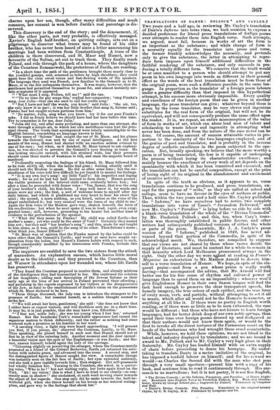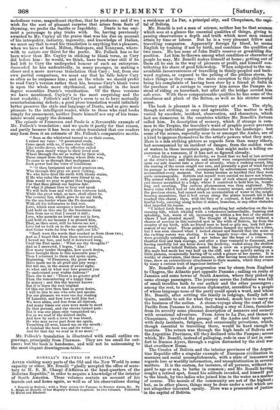TRANSLATIONS OF DANTE : POLLOCK e AND CA.YLET.t Two years
and a half ago, in reviewing Mr. Cayley's translation of Dante's Inferno into terra rima, we took occasion to express a decided preference for literal prose translations of foreign poems over attempts to render them into English verse. Such attempts, we argued, must fail, because in works of art the form is as important as the substance ; and while change of form is a necessity equally for the translator into prose and verse, the former frankly acknowledges the necessity, and pretends only to give the substance, the latter in attempting to repro- duce form imposes upon himself additional difficulties in the faithful rendering of the substance, and only succeeds in pro- ducing a totally different form. We conceive that the truth would be at once manifest to a person who should attempt to put any poem in his own language into words as different in their general effect as the words of the best translation must be from those of the original poem, were such a difference possible in the same lan- guage. In proportion as the translator of a foreign poem labours under a greater difficulty than that imposed in this hypothetical attempt, is his emcees snore obviously impossible. Every quality and excellence of the foreign poem that can be given in another language, the prose translator can give; whatever beyond these is given by the verse translator, may be very clever and ingenious substitutes for the real form of the original, but will not be its equivalent, and will not consequently produce the same effect upon the reader. It is, we repeat, an entire misconception of the value of form in works of art, which can alone lead men of talent and scholarship to waste labour and ingenuity in attempting what never has been done, and from the nature of the case never can be done. Of course, the amount of success attainable varies in pro- portion to the similarity of the two languages employed, and of the genius of poet and translator, and is probably in the inverse degree of testhetic excellence in the poem subjected to the ope- ration. But, broadly speaking, we believe that the more worthy a poem is of being translated, the less is it capable of undergoing the process without losing its characteristic excellence; and mainly because the excellence of every work of art depends on the spontaneity with which it has been conceived and executed, and the translation can but be careful composition, except at the price of losing sight of its original in the abandonment and excitement of creative activity. In spite of the truth so obvious, as it appears to us, verse translations continue to be produced, and prose translations, ex- cept for the purpose of " cribs," as they are called at school and college, seem to have no favour in the eyes of authors or public. Thus, within the two years and a half since Mr. Cayley published the " Inferno," we have ourselves had to notice two complete translations into verse of Tasso's "Jerusalem Delivered," and now Mr. Cayley's " Paradiso " is lying before us side by side with a blank-verse translation of the whole of the "Divine Commedia" by Mr. Frederick Pollock ; and this, too, when Cary's trans- lation was thoroughly established in public favour, and other writers had subsequently published versions of either the whole or parts of the poem. Meanwhile, Mr. J. A. Carlyle's prose version of the "Inferno," published in 1849, has never ad- vanced beyond that portion of the Commedia, in spite of its acknowledged merit. We, therefore, are compelled to suppose that our views are not shared by those whose tastes decide the supply of literature, and must be content for a while to remain in that minority which Lord Melbourne pronounced always in the right. Only the other day we were aghast at reading iu Fraser's Magazine an exhortation to Mr. Mathew Arnold to devote him- self to a verse translation of Homer. We hope, in spite of the elo- quent praise—and from a pen . whose praise is really worth having—that accompanied the advice, that Mr. Arnold will find better use for his fine sense of rhythm and cultured power of language than to spend them on an impossibility : whoever wou/I give Englishmen Homer in their own Saxon tongue will find the task hard enough to preserve the clear transparent speech, the homely imagery, the true colour of each epithet, and the true force of every noun, verb, and particle, without attempting to set it all to music, which after all would not be the Homeric hexameter, or anything at all like it. If there were no poetry in English worth reading, or if there were so little as to be soon exhausted, the case would be different ; but those who have not leisure to learn foreign languages, had far better drink deep of our own noble springs, than spend their time over foreign poems dressed up and disfigured so that their authors would not know them again, or would be the
first to invoke all the direst tortures of the Parnassian court on the heads of the barbarians who had wrought these cruel counterfeits. While, however, we hold these opinions, we are not blind to the talent and industry displayed by translators ; and we are bound to
award to Mr. Pollock and to Mr. Cayley a very high place in their fraternity. Mr. Cayley has loaded himself with an extra supply of chain before proceeding to dance his hornpipe. By under- taking to translate Dante in a metre imitative of the original, he has imposed a tenfold labour on himself; and for his reward we would—as Charles the Second did with the man who shot peas through a very small aperture—present him with a copy of his book, and sentence him to read it continuously through. ills suc- cess is to us marvellous ; but it is not poetry, it is nut fine English, • The Divine Comedy: or the Inferno, Purgatory, and Paradise, of Dante Alight- en. Rendered into English Verse by Frederick Pollock, Esq. With fifty Illustra- tions, drawn by George Schadjun. ; engraved by Dalziel. Published to Chapman and Hall. + Dante's Divine Comedy. The Paradise. Translated in the original ternary rhyme, by C. B. Cayley, B.A. Published by Longman and Co.
melodious verse, magnificent rhythm, that he produces ; and if we wish for the sort of pleasant surprise that arises from feats of rhyming, we prefer the Smiths or Ingoldsby. Dante is too emi- nent a personage to play tricks with. So, having previously awarded to Mr. Cayley all the praise that was his due on account of his intrepidity, industry, ingenuity, and knowledge of Italian, we must say that to read his translation is anything but a pleasure, when we have at hand, Milton, Shakspere, and Tennyson, where- with to satiate our thirst for the poetic. Mr. Pollock has so far been wiser than Mr. Cayley in sticking to blank verse, as Cary did before him : he would, we think, have been wiser still if he had left to Cary the undisputed honour of such an enterprise. Succeeded he has undoubtedly, in many passages, in making a closer and a more nervous translation than Cary ; but, from our own partial comparison, we must say that he falls below Cary as often as he surpasses him ; and on the whole we should prefer to read Cary's version rather than his, because Cary's blank verse is upon the whole more rhythmical, and neither in the least degree resembles Dante's versification. Of the three versions we have mentioned, Cayley's is the most surprising and the least readable ; Pollock's and Cary's seem to us to have mutually counterbalancing defects; a good prose translation would infinitely better preserve the style and language of Dante, and so give more pleasure to the intelligent reader, while to those who read books simply for amusement, neither Dante himself nor any of his trans- lators would supply the demand.
The episode of Francesca and Paolo is a ;favourable example of Mr. Pollock's translation ; and we quote it partly for that reason, and partly because it has been so often translated that our readers may form from it an estimate of Mr. Pollock's comparative merits.
"Soon as the whirlwind turned to us their course,
I raised my voice : 0 persecuted souls, Come speak with us, if none else forbids.' Like turtle-doves, who by affection called With open steady wings to their loved nest Wheel through the air as wafted by their wish, These issued from the throng where Dido was To come to us through that malignant air : Such power had the voice of kindliness.
" ' 0 thou benignant and most gracious one,
Who through this gray air goest visiting, We who have dyed the earth with bloody stains, If He who rules the world were friend to us, Him would we pray to grant thee happiness, For that thou pitiest our hapless fate. Of what it pleases thee to hear and speak We will both hear and with thee converse hold, While the great wind, as now, shall silent be. The country lies, which gave to me my birth, On the sea-border where the Po descends With all his tributaries to find rest.
Love' which soon occupies a tender heart,
Laid hold on this one by the beauteous form Torn from me so that I resent it still ; Love, who permits no loved one not to love, Laid hold on me because I so pleased him, That, as thou seest, still he leaves me not ; Love led us both on to the one same death, And Caine waits for him who spilt our life.'
"Such were the words that reached us from those two ; And as I heard this from those tortured souls, I bowed my face, and held it downward long, Until the Poet spoke : What are thy thoughts ?' And as I answered, I began, ' Alas ! How many tender thoughts, how much desire, Have brought them to this miserable pass !' Then I returned to them and spoke again, Beginning, 0 Francesca thy great woes Have made me in all grief and pity weep:
But tell me, in the season of sweet sighs,
At what and in what way love granted you To understand your wishes dubious ?' Then she to me : There is no greater grief Than the remembering of a happy time In misery ; and this thy teacher knows: But if to learn the root original Of this our love thou hast so great desire, I "will be like to one who sobs and speaks. For our pleasure we were one day reading Of Lancelot, and how love held him fast : We were alone, and free from all distrust, And many times our eyes were made to meet By that perusal, and our cheeks turned pale : But it was one place only vanquished us; For as we read of the desired smile, And how by such a lover it was kissed, He who may never part from me again, Trembling all ever, kissed me on the mouth : A Galahad the book was and its writer; And for that day we read in it no more.'"
Mr. Pollock's translation is illustrated with small outline en- gravings, principally from Flaxman. They are too small for out- lines; but the book is handsome, and will not be unbecoming to the most elegant drawingroom-table.



































 Previous page
Previous page